实验2 类和对象_基础编程1
实验任务1:
t.h

#pragma once #include <string> // 类T: 声明 class T { // 对象属性、方法 public: T(int x = 0, int y = 0); // 普通构造函数 T(const T &t); // 复制构造函数 T(T &&t); // 移动构造函数 ~T(); // 析构函数 void adjust(int ratio); // 按系数成倍调整数据 void display() const; // 以(m1, m2)形式显示T类对象信息 private: int m1, m2; // 类属性、方法 public: static int get_cnt(); // 显示当前T类对象总数 public: static const std::string doc; // 类T的描述信息 static const int max_cnt; // 类T对象上限 private: static int cnt; // 当前T类对象数目 // 类T友元函数声明 friend void func(); }; // 普通函数声明 void func();
t.cpp

// 类T: 实现 // 普通函数实现 #include "t.h" #include <iostream> #include <string> using std::cout; using std::endl; using std::string; // static成员数据类外初始化 const std::string T::doc{"a simple class sample"}; const int T::max_cnt = 999; int T::cnt = 0; // 对象方法 T::T(int x, int y): m1{x}, m2{y} { ++cnt; cout << "T constructor called.\n"; } T::T(const T &t): m1{t.m1}, m2{t.m2} { ++cnt; cout << "T copy constructor called.\n"; } T::T(T &&t): m1{t.m1}, m2{t.m2} { ++cnt; cout << "T move constructor called.\n"; } T::~T() { --cnt; cout << "T destructor called.\n"; } void T::adjust(int ratio) { m1 *= ratio; m2 *= ratio; } void T::display() const { cout << "(" << m1 << ", " << m2 << ")" ; } // 类方法 int T::get_cnt() { return cnt; } // 友元 void func() { T t5(42); t5.m2 = 2049; cout << "t5 = "; t5.display(); cout << endl; }
task1.cpp

#include "t.h" #include <iostream> using std::cout; using std::endl; void test(); int main() { test(); cout << "\nmain: \n"; cout << "T objects'current count: " << T::get_cnt() << endl; } void test() { cout << "test class T: \n"; cout << "T info: " << T::doc << endl; cout << "T objects'max count: " << T::max_cnt << endl; cout << "T objects'current count: " << T::get_cnt() << endl << endl; T t1; cout << "t1 = "; t1.display(); cout << endl; T t2(3, 4); cout << "t2 = "; t2.display(); cout << endl; T t3(t2); t3.adjust(2); cout << "t3 = "; t3.display(); cout << endl; T t4(std::move(t2)); cout << "t3 = "; t4.display(); cout << endl; cout << "T objects'current count: " << T::get_cnt() << endl; func(); }
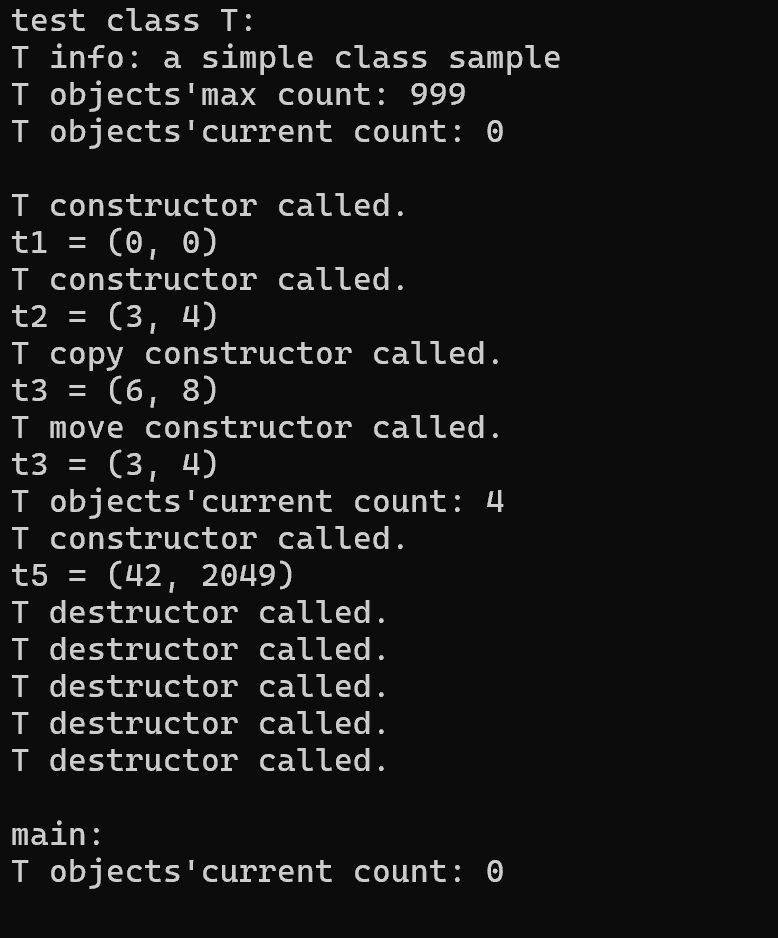
问题1:

不能,因为编译器找不到func函数的定义。
问题2:
1.普通构造函数:功能是用于创建对象时初始化对象的成员变量。时机是对象被创建时。
2.复制构造函数:功能是用于创建一个新对象,作为已有对象的副本。时机是使用已存在的对象初始化另一个对象时。
3.移动构造函数:功能是用于移动构造对象,适用于临时对象。时机是对象被移动时,通常在返回临时对象、使用std::move函数时。
4.析构函数:时机是对象被销毁时。
问题3:不能。
实验任务2:
complex.h

#pragma once #include <iostream> #include <cmath> class Complex { public: static const std::string doc; private: double real; double imag; public: Complex(); Complex(double r); Complex(double r, double i); Complex(const Complex &c); double get_real() const; double get_imag() const; void add(const Complex &c); friend Complex add(const Complex &c1, const Complex &c2); friend bool is_equal(const Complex &c1, const Complex &c2); friend bool is_not_equal(const Complex &c1, const Complex &c2); friend void output(const Complex &c); friend double abs(const Complex &c); };
complex.cpp

#include "Complex.h" const std::string Complex::doc = "a simplified complex class"; Complex::Complex() : real(0), imag(0) {} Complex::Complex(double r) : real(r), imag(0) {} Complex::Complex(double r, double i) : real(r), imag(i) {} Complex::Complex(const Complex &c) : real(c.real), imag(c.imag) {} double Complex::get_real() const { return real; } double Complex::get_imag() const { return imag; } void Complex::add(const Complex &c) { real += c.real; imag += c.imag; } Complex add(const Complex &c1, const Complex &c2) { return Complex(c1.real + c2.real, c1.imag + c2.imag); } bool is_equal(const Complex &c1, const Complex &c2) { return (c1.real == c2.real) && (c1.imag == c2.imag); } bool is_not_equal(const Complex &c1, const Complex &c2) { return (c1.real != c2.real) || (c1.imag != c2.imag); } void output(const Complex &c) { std::cout << c.real << (c.imag >= 0 ? " + " : " - ") << std::abs(c.imag) << "i"; } double abs(const Complex &c) { return std::sqrt(c.real * c.real + c.imag * c.imag); }
task2.cpp

#include "Complex.h" const std::string Complex::doc = "a simplified complex class"; Complex::Complex() : real(0), imag(0) {} Complex::Complex(double r) : real(r), imag(0) {} Complex::Complex(double r, double i) : real(r), imag(i) {} Complex::Complex(const Complex &c) : real(c.real), imag(c.imag) {} double Complex::get_real() const { return real; } double Complex::get_imag() const { return imag; } void Complex::add(const Complex &c) { real += c.real; imag += c.imag; } Complex add(const Complex &c1, const Complex &c2) { return Complex(c1.real + c2.real, c1.imag + c2.imag); } bool is_equal(const Complex &c1, const Complex &c2) { return (c1.real == c2.real) && (c1.imag == c2.imag); } bool is_not_equal(const Complex &c1, const Complex &c2) { return (c1.real != c2.real) || (c1.imag != c2.imag); } void output(const Complex &c) { std::cout << c.real << (c.imag >= 0 ? " + " : " - ") << std::abs(c.imag) << "i"; } double abs(const Complex &c) { return std::sqrt(c.real * c.real + c.imag * c.imag); }
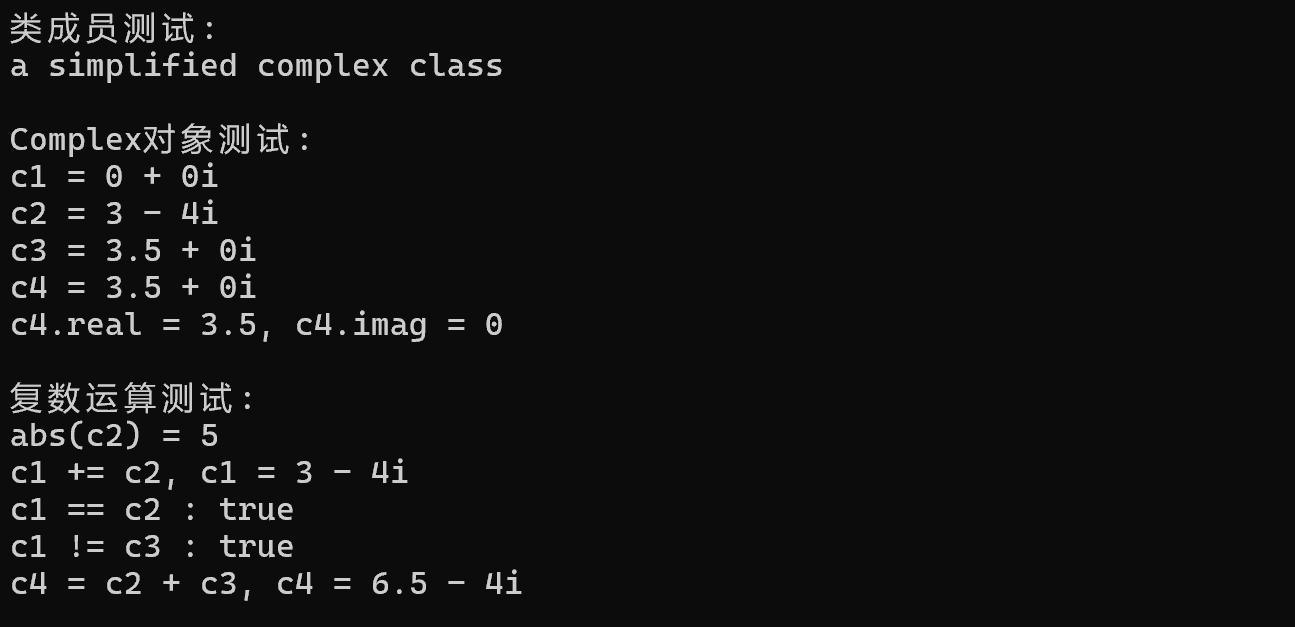
实验任务3:

#include <iostream> #include <complex> using std::cout; using std::endl; using std::boolalpha; using std::complex; void test() { cout << "标准库模板类comple测试: " << endl; complex<double> c1; complex<double> c2(3, -4); const complex<double> c3(3.5); complex<double> c4(c3); cout << "c1 = " << c1 << endl; cout << "c2 = " << c2 << endl; cout << "c3 = " << c3 << endl; cout << "c4 = " << c4 << endl; cout << "c4.real = " << c4.real() << ", c4.imag = " << c4.imag() << endl; cout << endl; cout << "复数运算测试: " << endl; cout << "abs(c2) = " << abs(c2) << endl; c1 += c2; cout << "c1 += c2, c1 = " << c1 << endl; cout << boolalpha; cout << "c1 == c2 : " << (c1 == c2) << endl; cout << "c1 != c3 : " << (c1 != c3) << endl; c4 = c2 + c3; cout << "c4 = c2 + c3, c4 = " << c4 << endl; } int main() { test(); }
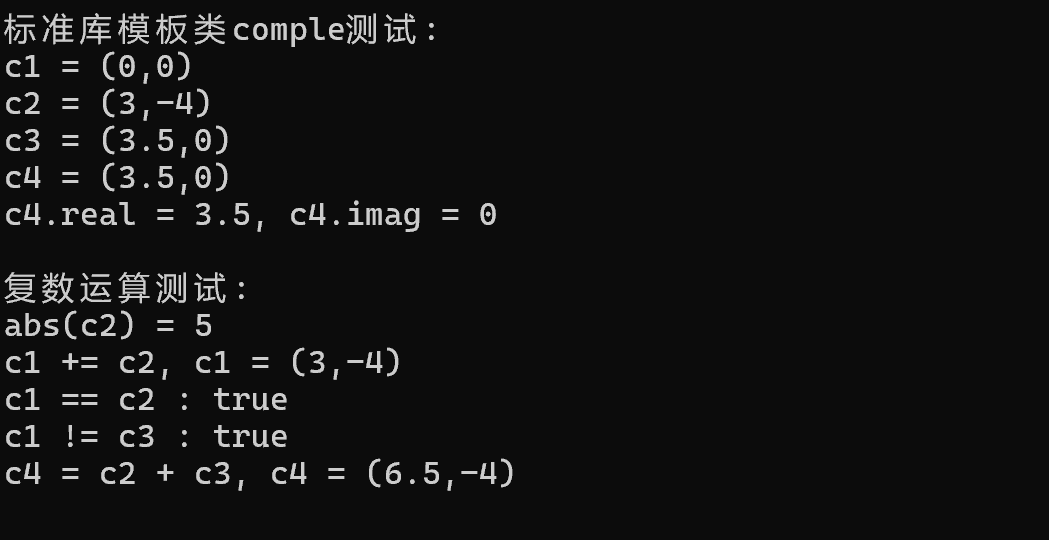
对比任务2:
1.可以调用成员函数,直接访问复数的实部和虚部。可以直接使用cout进行输出。可以直接对复数进行相加,取模运算,判断是否相等。
2.掌握标准库模板类的使用可以简化程序。
实验任务4:
Fraction.h

#pragma once #include<iostream> #include<string> using namespace std; class Fraction{ public: Fraction(int x,int y = 1); Fraction(const Fraction &f); ~Fraction(); int get_up() const; int get_down() const; Fraction negative(); private: int up; int down; public: static const string doc; friend void output(const Fraction &f); friend Fraction add(const Fraction &f1,const Fraction &f2); friend Fraction sub(const Fraction &f1,const Fraction &f2); friend Fraction mul(const Fraction &f1,const Fraction &f2); friend Fraction div(const Fraction &f1,const Fraction &f2); };
Fraction.h

#include "Fraction.h" #include <iostream> #include <string> #include<math.h> #include<cmath> using std::cout; using std::endl; using std::string; const std::string Fraction::doc = "Fraction类 v 0.01版。\n目前仅支持分数对象的构造,输出,加/减/乘/除运算。"; Fraction::Fraction(int x,int y){ int a = abs(x),b = y; while (b!=0) { int temp =b; b = a % b; a =temp; } up = x /a; down = y/a; } Fraction::Fraction(const Fraction &f): up{f.get_up()},down{f.get_down()}{ } Fraction::~Fraction(){ } int Fraction::get_up() const{ return up; } int Fraction::get_down() const{ return down; } Fraction Fraction::negative(){ return Fraction((-1)*up,down); } void output(const Fraction &f){ if(f.get_down() == 0){ cout << "分母不能为0"; return; } if(f.get_down() == 1){ cout << f.get_up(); }else{ cout << f.get_up() << "/" << f.get_down(); } } Fraction add(const Fraction &f1,const Fraction &f2){ int gcd = f1.get_down(); int temp_b = f2.get_down(); while (temp_b != 0) { int temp = temp_b; temp_b = gcd % temp_b; gcd = temp; } int minMax = std::abs(f1.get_down()*f2.get_down()) / gcd; int i = minMax/f1.get_down(); int j = minMax/f2.get_down(); return Fraction(i*f1.get_up() + j*f2.get_up(),minMax); } Fraction sub(const Fraction &f1,const Fraction &f2){ int gcd = f1.get_down(); int temp_b = f2.get_down(); while (temp_b != 0) { int temp = temp_b; temp_b = gcd % temp_b; gcd = temp; } int minMax = std::abs(f1.get_down()*f2.get_down()) / gcd; int i,j; i = minMax/f1.get_down(); j = minMax/f2.get_down(); return Fraction(i*f1.get_up() - j*f2.get_up(),minMax); } Fraction mul(const Fraction &f1,const Fraction &f2){ return Fraction(f1.get_up()*f2.get_up(),f1.get_down()*f2.get_down()); } Fraction div(const Fraction &f1,const Fraction &f2){ return Fraction(f1.get_up()*f2.get_down(),f1.get_down()*f2.get_up()); }
task4.cpp

#include "Fraction.h" #include <iostream> using std::cout; using std::endl; void test1() { cout << "Fraction类测试: " << endl; cout << Fraction::doc << endl << endl; Fraction f1(5); Fraction f2(3, -4), f3(-18, 12); Fraction f4(f3); cout << "f1 = "; output(f1); cout << endl; cout << "f2 = "; output(f2); cout << endl; cout << "f3 = "; output(f3); cout << endl; cout << "f4 = "; output(f4); cout << endl; Fraction f5(f4.negative()); cout << "f5 = "; output(f5); cout << endl; cout << "f5.get_up() = " << f5.get_up() << ", f5.get_down() = " << f5.get_down() << endl; cout << "f1 + f2 = "; output(add(f1, f2)); cout << endl; cout << "f1 - f2 = "; output(sub(f1, f2)); cout << endl; cout << "f1 * f2 = "; output(mul(f1, f2)); cout << endl; cout << "f1 / f2 = "; output(div(f1, f2)); cout << endl; cout << "f4 + f5 = "; output(add(f4, f5)); cout << endl; } void test2() { Fraction f6(42, 55), f7(0, 3); cout << "f6 = "; output(f6); cout << endl; cout << "f7 = "; output(f7); cout << endl; cout << "f6 / f7 = "; output(div(f6, f7)); cout << endl; } int main() { cout << "测试1: Fraction类基础功能测试\n"; test1(); cout << "\n测试2: 分母为0测试: \n"; test2(); }
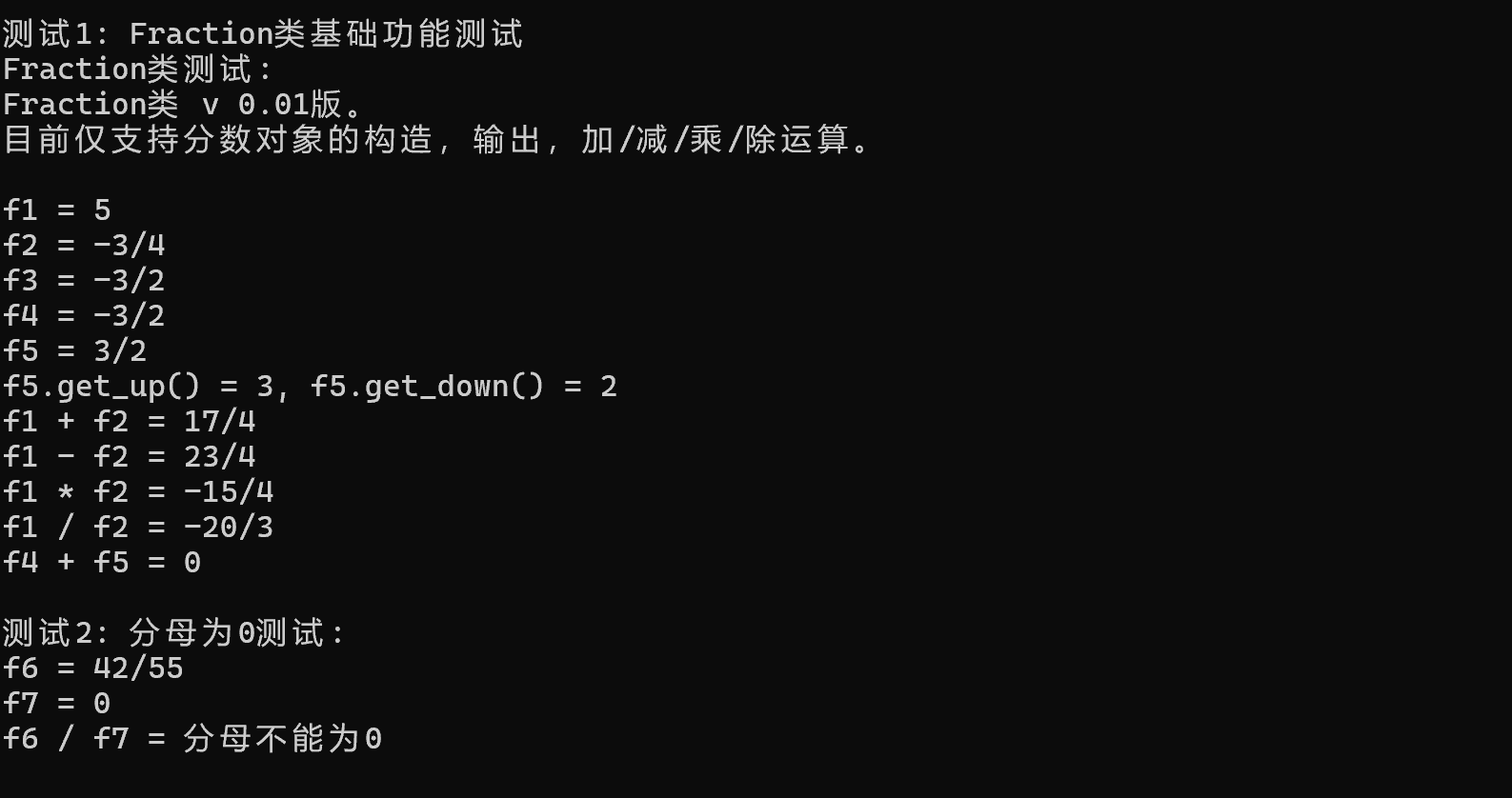
实验任务5:
account.h

#pragma once class SavingAccount { private: int id; double balance; double rate; int lastDate; double accumulation; static double total; void record(int date, double amount); double accumulate(int date) const { return accumulation + balance * (date - lastDate); } public: SavingAccount(int date, int id, double rate); int getId() const { return id; } double getBalance() const { return balance; } double getRate() const { return rate; } static double getTotal() { return total; } void deposit(int date, double amount); void withdraw(int date, double amount); void settle(int date); void show() const; };
account.cpp

#include"account.h" #include<iostream> #include<cmath> using namespace std; double SavingAccount::total = 0; SavingAccount::SavingAccount(int date, int id, double rate) : id(id), balance(0), rate(rate), lastDate(date), accumulation(0) { cout << date << "\t#" << id << " is created" << endl; } void SavingAccount::record(int date, double amount) { accumulation = accumulate(date); lastDate = date; amount = floor(amount * 100 + 0.5) / 100; balance += amount; total += amount; cout << date << "\t#" << id << "\t" << amount << "\t" << balance << endl; } void SavingAccount::deposit(int date, double amount) { record(date, amount); } void SavingAccount::withdraw(int date, double amount) { if (amount > getBalance()) cout << "Error: not enough money" << endl; else record(date, -amount); } void SavingAccount::settle(int date) { double interest = accumulate(date) * rate / 365; if (interest != 0) record(date, interest); accumulation = 0; } void SavingAccount::show() const { cout << "#" << id << "\tBalance: " << balance; }
task5

#include "account.h" #include <iostream> using namespace std; int main() { SavingAccount sa0(1, 21325302, 0.015); SavingAccount sa1(1, 58320212, 0.015); sa0.deposit(5, 5000); sa1.deposit(25, 10000); sa0.deposit(45, 5500); sa1.withdraw(60, 4000); sa0.settle(90); sa1.settle(90); sa0.show(); cout << endl; sa1.show(); cout << endl; cout << "Total: " << SavingAccount::getTotal() << endl; }
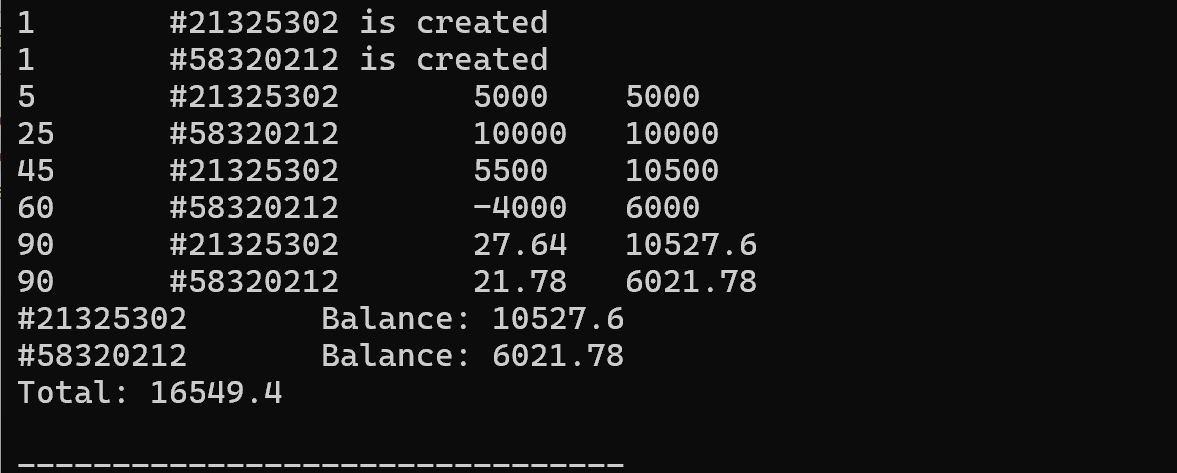
合理




